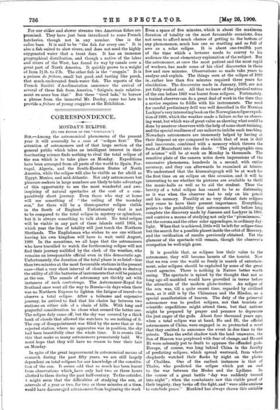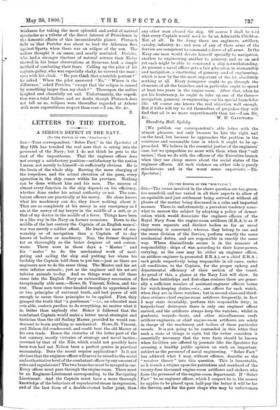CORRESPONDENCE.
MONDAY'S ECLIPSE.
(TO THE EDITOR OF THE " SPECTATOR:1
Sui,—Among the astronomical phenomena of the present year it will assuredly be a case of "eclipse first." The attention of astronomers and of that large section of the general public which takes an intelligent interest in their fascinating science finds nothing to rival the total eclipse of the sun which is to take place on Monday. Expeditions hake been arranged from all parts of the world to Spain, Por- tugal, Algeria, and the South-Eastern States of North America, while the eclipse will also be visible as far afield as Egypt, Mexico, and mid-Atlantic. Not only astronomers but pleasure-seekers in large numbers are likely to take advantage of this opportunity to see the most wonderful and awe- inspiring of natural spectacles at the cost of a com- paratively short journey. Even those who stay at home will see something of "the veiling of the noonday sun," for there will be a three-quarter eclipse visible in the South of England. Unfortunately that is not to be compared to the total eclipse in mystery or splendour, but it is always something to talk about. No total eclipse will be visible in any part of these islands until 1954, in which year the line of totality will just touch the Northern Shetlands. The Englishman who wishes to see one without leaving his own kingdom will have to wait until August, 1999. In the meantime, we all hope that the astronomers who have travelled to watch the forthcoming eclipse will not find their journey nullified by the clerk of the weather, who remains an irresponsible official even in this democratic age. Unfortunately, the duration of the total phase is so brief—less than two minutes at the most favourable stations in the present case—that a very short interval of cloud is enough to destroy the utility of all the batteries of instruments that will be pointed at the sun. The annals of astronomy are thickly set with instances of such contretemps. The Astronomer-Royal for Scotland once went all the way to Russia—in days when there was no Northern Express to lighten the fatigue of travel—to observe a total eclipse. After a toilsome and expensive journey, he arrived to find that his choice lay between two stations on either side of a chain of hills. With long and prayerful consideration he chose what seemed the better one. The eclipse duly came off, but the sky was covered by a thick bank of clouds that allowed the watchers to see nothing of it. The cup of disappointment was filled by the news that at the rejected station, where no apparatus was in position, the sky had been beautifully clear the whole time. It is events like this that make so many astronomers prematurely bald. We must hope that they will have no reason to tear their hair on Monday.
In spite of the great improvement in astronomical means of research during the past fifty years, we are still largely dependent on total eclipses for our knowledge of the constitu- tion of the sun. It seems odd that so much has been learnt from observations which, have only had two or three hours allotted to them during the past half-century. To the outsider, t might seem that the 'difficulties of studying the sun, at intervals of a year or two, for two of three minutes at a time, would have discouraged astronomers from beginning the work _ . . Even a space of five minutes, which is about the maximum duration of totality on the most favourable occasions, does not seem to afford much chance of getting" to the bottom of any, phenomenon, much less one so startling and so full of awe as a solar eclipse. It is about one-twelfth part of the time which a lecturer needs to convey to his audience the most elementary explanation of the Subject. Rut the astronomer, at once the most patient and the most rapid of workers, has made some -of his chief discoveries in these few and rare minutes. Observations so made take years to analyse and explain The things seen at the eclipse of 1893 in .rather less than five minutes required three years for elucidation. The discoveries made in January, 1898, are not yet fully worked out. All that we knew of the physical nature of the sun before 1868 was learnt from eclipses. Fortunately, a trained observer can do a great deal of work in the time that a novice requires to fiddle with his instruments. The need for careful preliminary drill was well described in Sir Nornian Lockyer's very interesting book on the Norwegian eclipse expedi - tion of 1896, which the weather made a failure so far as observ- ing went, but which was of great value as showing what could be done by amateur observers with the help of some short training, and the special readiness of our sailors to imbibe such teaching. Nowadays astronomers are immensely helped by having at their disposal an eye compared to which that of man is dull and inaccurate, combined with a memory which throws the feats of Mezzofanti into the shade. "The photographic eyes of science" will be at work on Monday in thousands. The sensitive plate of the camera notes down impressions of the successive phenomena, hundreds in a second, with entire accuracy, and they can afterwards be examined at leisure. We understand that the kinematograph will be at work for the first time on an eclipse on this occasion, and it will be interesting to see whether its pictures are available to thrill the music-halls as well as to aid the student. Thus the brevity of a total eclipse has ceased to be so distressing as it was when the observer had to rely on his pencil and his memory. Possibly at no very distant date eclipses may cease to have their present importance. Everything points to the probability that astronomers will before long complete the discovery made by Janssen and Lockyer in 1868, and contrive a means of studying not only the "prominences," but the corona and the other solar appendages, in ordinary day- light. When that is achieved, little will be left for eclipse-time but the search for a possible planet inside the orbit of Mercury, and the verification of results previously obtained. Yet the glamour of the spectacle will remain, though the observer's occupation be well-nigh gone.
It is possible that, as eclipses lose their value to the astronomer, they will become haunts of the tourist. Now that we run over the world so freely in search of entertain- ment, solar eclipses should be exploited by some of the great travel agencies. There is nothing in Nature better worth seeing. The spectacle is tpiced by the' thought that not so long ago all mankind would have grovelled in terror before the attraction of the modern globe-trotter. An eclipse of the sun was, till a quite recent time, regarded by civilised man, as it still is by the Chinaman and the Hindoo, as a special manifestation of heaven. The duty of the primeval astronomer was to predict eclipses, not that tourists or scientific expeditions might attend them, but that nations might be prepared by prayer and penance to deprecate the just anger of the gods. About four thousand years ago, when a total eclipse was at hand, Ho and Hi, the official astronomers of China, were engaged in so protracted a revel that they omitted to announce the event in due time to the priests. Thus the awful shadow took the land unawares, the Son of Heaven was perplexed with fear of change, and Ho and Hi were solemnly put to death to appease the offended gods. Europe, of course, was long behind China in the faculty of predicting eclipses, which spread westward, from where shepherds watched their flocks by night on the plains of Chalasea. One of the earliest instances is that of nudes, who predicted the eclipse which put an end to the war between the Medea and the Lydisns. In the course of a great battle "day was suddenly turned into night " ; when the combatants saw this visible proof of theii impiety, they broke off,the fight, and "were alike anxious to conclude peace." Mankind has always shown this amiable
Weakness for taking the most splendid and awful of natural lipeetacles as a tribute of the direct interest of Providence in the domestic affairs of " this inconsiderable planet: Plutarch
us-that Pericles was about to lead the Athenian fleet :against Sparta when there was an eclipse of the sun. The .841ors thought it an- omen, 'and nearly mutinied. "Pericles, had.a, stronger tincture of natural science than Nicias 46104 ha hiS lunar observations at Syracuse, took a simple "niq'thcid of combating theirfears: Calling hp the pilot of his "captain-ialley,"whil was especially shaky; he covered the man's
eyes, cloak. "Do you think' thata terrible portent ? " he isked. 'When the pilot answered "No," "Where is the
• difference," asked 'Pericles, "except that the eclipse is caused 'bysoreethiig larger than my cloak ?" Thereupon the sailors laughed and cheerfully set sail. Unfortunately, the expedi- tion was a total .failure, and no doubt, though Plutarch does 'not fell us sir, eclipses were thereafter regarded at Athens with more superstitious respect than ever.—I am, Sir, &c.,
z.







































 Previous page
Previous page